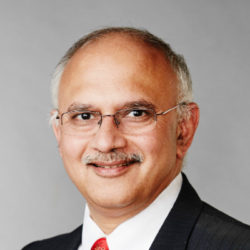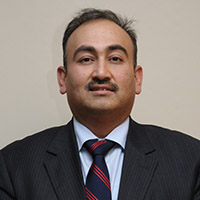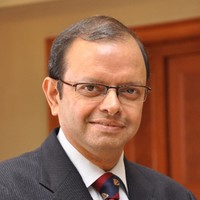
EDITION 4
Friday
June 4, 2021
AnandSpeak
Dr. Anand Deshpande, founder-chairman of Persistent Systems, is like a treasure trove. Any which way you look at him there are things to learn, things that you will benefit from, grow. No wonder then that this session was hugely attended by more than 600 people who sat till the end, spellbound. This My Story Session that was anchored by Vineet Patni (Charter Member and Managing Partner, WePartner Consult). We present here some glimpses of this interesting session:

Dr. Anand Deshpande

Vineet Patni
On Entrepreneurship:
What every entrepreneur should focus on is having a plan. What I learned over the years is that if you have a plan and if you have a map of where things are and where you want to be, then at the time when that opportunity arises, you’re ready to accept it, and ready to move along with it. That is the main benefit of having a plan. So, plan where you are and where you want to be.
On Mentors:
I firmly believe in mentorship. I have several mentors and I sort of classify them into four different parts. I’ll give you a mythological example for this. So, in your puja room you have a set of deities, Ganesh, Shiva, Vishnu. And each one of them performs different roles. When you are running a business, you need a mentor group, a mentor panchayat of say some five or six people who bring in different aspects into your life. I had a few technical gurus with whom I would work. They were friends and then their kids and different people who bring in different points of view. So that’s one part of the mentorship. The second kind of mentors are those who I would call the Eklavya-Dronacharya kind of mentors. These are people whose work you read, learn and imbibe, and they don’t necessarily know that they are mentoring you. So that’s the other kind of mentorship. The third one is interesting – the Narsimha type who is there when you need him and with the right tools to help you. So, it’s important that you have that ability to create Narsimha who will appear at the right time with the right tools. And finally, there is Dharma for which you need Krishna with you. But Krishna has to be cultivated. He didn’t appear because Arjuna wanted him, it was because of a relationship that made it happen. And this is something I have done very meticulously in my life.
On Networking:
If I am a good networker, I think I owe it to my grandfather who was an excellent networker. One of his philosophies was that when you ask someone to do something for you, they should enjoy doing it. As an Income Tax Commissioner who used to travel by train to Nagpur, Kolhapur, he would ask his friends for lunch or dinner boxes along the way. This was not just because of mutual respect, but they also enjoyed being asked, and he enjoyed meeting them on the way. He was an amazing networker and had so many people coming over to meet him daily. My grandmother would make tea like six to seven times every day. So, this is partly genetic for me, but I have thought this through a little further. How do you leverage your network to be valuable? So as a salesperson I meet a lot of people, but you don’t remember everyone, do you? Why is it that you remember some and not the others? I have come to this conclusion that if you sort of challenge the person, get into a discussion where they start thinking about you even after the meeting, then they are more likely to remember you. I found that to be very useful, and I deliberately do it now. I provoke a guy into a discussion, and it keeps the thread going. I find the best sales deals happen when the customer calls to say, hey, I remember you mentioned this to me. I think we need something in this area, perhaps you can help?
Message to founders:
I think a lot of times, we all get stuck with the fact that there is no difference between me and my company. It is very important to discuss this. A company has its own identity and we as individuals have our own. And as founders, we are responsible for making sure that the company is successful on its own. We should not be holding it back in terms of our aspirations and our company’s aspirations, so those two are very different things. Often when you have to fire someone the equation gets mixed up. It is important at that time to look at what is right for the company and not necessarily what is right for you. A lot of times we hesitate in doing things in a certain way because we bring ourselves in the mix up. So, when you are trying to fire someone, or when you have to deal with an adverse situation, I tell people, you can’t hug and shoot at the same time. If you do that, you will kill yourself. The point is to have that distance where you say I’m going to do a data driven meeting, I’m doing this for the company. I’m representing the company, it’s not personal at that point. This is very important.
Managing Crisis:
When the market went down in 2001, and we were all struggling, and I got very desperate thinking my customers will go away. That I should try and find new customers. Then people told me that when times are desperate, nobody is going to give you business, if they don’t know you, they don’t know how you will perform. So, the thing to do is not go after new customers but to hug your existing customers even if their companies close down, and they land somewhere else.
When dealing with CEOs:
If you are selling to a CEO you must know this, CEOs think very differently from non-CEOs. The first thing is that all CEOs have a few things that they care about personally. Everything else is delegated, so normally product engineering, outsource product development, all that stuff is delegated to the VP engineering. If you are having a conversation with the CEO, you better have something that is relevant to him. The first thing you say is what you can do for the company. The second interesting thing I found is that most CEOs are not just bottom line focussed but also interested in the top line. So, if my offering is reducing his cost in engineering, he’ll say yeah that’s great, but that’s not my focus. That’s for my VP engineering or CFO, my focus is how do I grow revenue? What can you do to help me grow that? So that becomes a CEOs point of view. The third thing I found is that CEOs are very relationship oriented, not just transactional.

Ganesh Natarajan
GANESH NATARAJAN: So at what stage did you realise that life is not sequential, but is a set of parallel activities which you should pursue. And each one of them to its fullest.
When you are involved in the day-to-day running of your company you say OK, I’ll do this when I retire but when I was 50, I decided that I’ll do all the things that I pushed to after retirement. I have a mind map and I make notes of the things I want to do. Every week I go through them and keep tabs of my activities. I read, meet people, learn. It’s a constant activity.
Where The Money Is Moving:
Hyperlocal job discovery startup Jobsgaar raises $140K from SucSEED Indovation Fund, others
The funding will help Jobsgaar establish the proof of its concept and fund its product development and growth plan.
Intern hiring platform Cuvette Tech raises $180K from Titan Capital, others
The Bengaluru-based startup said it will use the funds to build its core team and develop the product.
9Unicorns leads seed round in litigation financier LegalPay
Apart from co-investors such as LetsVenture, other marquee angel investors, including Ambarish Gupta (founder of Basis Vectors, PE-fund based out of New York) also participated in the round.

